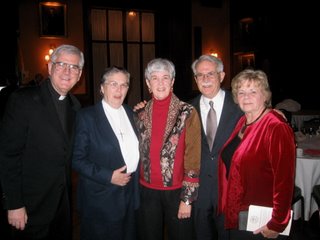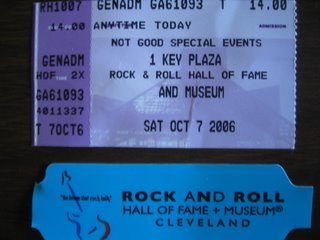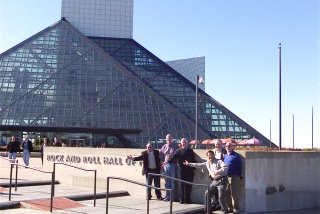 BARRY AWARD DINNER
BARRY AWARD DINNERWithout Win here to join us, Sister Ellen and I feel a little empty place in our hearts. Though it truly took a whole town, not just a village, to raise Gesu School from the ashes of the parish closing, Win’s kindness to us and to the children of Gesu school beginning back in 1989 made the difference: without him the future was a mountain of struggle and mediocrity. With him and his ideas Gesu has the energy to ascend as if on crystal stairs and reach for an excellence, knowing that it is within our grasp.
In the name of the three of us, I thank all of you. You came tonight to recognize the wonderful gift that Gesu School is to the children of Philadelphia. We thank the American Catholic Historical Society and the committee, especially Lou and Jim and the DiIulios for their gracious leadership and hard work.
And Sister Ellen and I acknowledge our siblings and other relatives who are joining us, Ellen’s sister Nancy and my siblings: Sister Mary (I introduce myself as her brother), Tony, Eileen and Jeanne with her husband Frank. I am grateful to speak about receiving the Barry Award for Gesu School because of my father’s love of Catholic history and my mother’s origins in County Kilkenny.
I often go back to the rich history of the Jesuits and the IHM Sisters at Gesu School. Father Villiger, the builder of the great Gesu Church, barely set foot on the property at 17th and Stiles in 1868 before he started the parish work with young children that would eventually flourish as a full parochial school. Then the Notre Dame Sisters first and then the IHM Sisters arrived on the site. Here is a directive that Father Villiger gave to the Jesuits who worked with him: “the Jesuits are not to interfere with the work of the sisters because the sisters know what they are doing.” Win and I, I think, paid attention to this directive when working with Sister Ellen. She for her part does not carry out another of Father Villiger’s directives. He wrote: “In order to preserve the proper decorum, do not dismiss the boys and girls at the same time.”
Let me continue with some remarks that Win himself would have made if he were here. That is I quote from a recent text that he wrote for presentation at the recent Gesu Symposium on Inner-City Education.
“We have faith in our teachers. Who demonstrate a dedication akin to vocations.
“We have faith in our families: mothers, fathers, aunts, uncles and grandparents who raise our beautiful and precious kids under the most difficult of circumstances. Without complaining. Although the injustice of their lives in this ridiculously richest of nations cries out for justice.
‘But most of all, we have faith in our children. Who come to our doors randomly, as toddlers, and depart as young men and women ready to assume productive roles. Were it not for this place and their caring families, society would come at them largely as a city of mean streets.
‘We don't exactly teach them that failure is not an option; they have only to look left or right on their perilous ways home at night to know that this is not the case. Failure is definitely an option [around here.]
“We teach them, rather, that, with dedication and hard work, and a credible faith in themselves, success in life is within their grasp. That they can believe in themselves. That, far from being losers, they are precious children of a caring God. They learn grammar and math and history and geography but all the while is the drumbeat of our faith in them and their consequent faith in themselves. This is our most important lesson.”
Thanks, Win. And a lesson that strengthens us all: we are brothers and sisters of the Lord Jesus; we are precious children of a caring God.
Win and Sister Ellen and I want you to know that the children have inspired relationships with so many of you and with so many others. These relationships bring a joy into our three lives that is far more than finite; today and into the future that joy knows no bounds. Thank you.




